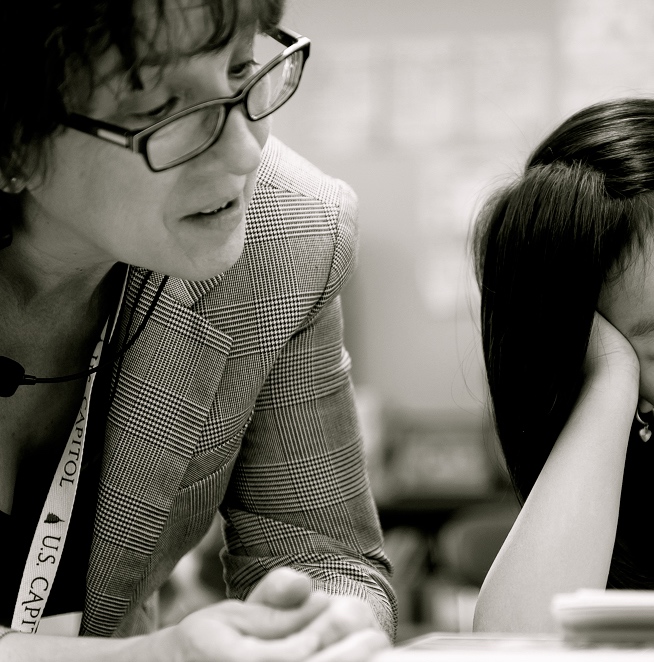Adventures in Web-meetings
 Here in the Northeast, we've endured some whacky weather - high winds and plenty of rain. Not exactly a hurricane, but a giant inconvenience, particularly for those without power since Sunday night. The wind damage and power outages resulted in school cancellations throughout the Merrimack Valley; some school districts are now left with just 2 of the allocated 5-day calendar allowance for snow days before snow season actually starts. Buckle those seat belts, it is going to be a bumpy ride this winter.So what does the weather have to do with web meetings? One of the off-shoots of a no-school day is that all activities after school are cancelled. For me, and the trusty group of participants in the graduate literacy course I am leading, that meant our All-Hallows-Eve session of EDUC 7226 was postponed and would need to be made up.So, in a semi-panic (okay, that was a full-blown panic), I offered the possibility of doing a conference call based lecture to the participants in lieu of a face-to-face class. Making up the class would be a scheduling problem in that the class sessions needed for the full course already occupy every Tuesday between mid-September and December 19. I was pretty certain no one would be enthusiastic about pushing out the end date to the first Tuesday after the holiday break, January 2. We needed to hold the Halloween class now somehow.Anticipating that with 2 days out of school, some people might actually want to try to hold this session even if it was held off-site, I started to wonder about having a conference call where participants could access the slides that I use to accompany our class session. It turned out that quite a few participants were willing to give this a go, even those who were without WIFI and electricity. The problem solvers in the group found ways to overcome those challenges, some even heading over to local coffee shops where WIFI and electricity could still be had.So, my task yesterday morning was to quickly get up-to-speed with webinars and conference calls. Never having hosted such a thing, I Googled "webinars" and discovered hosting an online web-meeting was indeed possible... at a cost of $89/month to $429/month. I was pretty sure the bookkeeper in this family would veto that. Next search was "free+webinar+software" and BINGO! The product I serendipitously discovered was Free Conference Calls.When something is free, there shouldn't be any expectation for easy use or full functionality. Free usually means there will be some pain for the user, because... free, what do you expect?This product, however, is the real deal. Since I had to come up to speed with the product in about 3 hours, I keep my wishlist simple: a) ability for access to audio only (for those listening in on cellphones) or for audio+shared screen b) easy (for me) to negotiate invites and manage participation, and c) free. Free Conference Calls was all of that - and I was able to record myself for participants who may need this class session on instant replay. Other functions that I didn't use (yet) included Q&A boards, break-out sessions, and using pointers and highlighters on my shared screen.At the appointed hour for our class to start, nearly all of the 22 participants in this course were logged in either as either full meeting participants or audio only. The audio recording resides on my Conference Call account as a weblink which will allow anyone who was unable to attend our live meeting to listen in later. And, considering that I'm not the most technology-saavy person on this planet, the fact that all of this went off without a disaster, is totally gratifying.Sometimes the stars do line up in our favor. We are Technology Warriors - every single one of us!
Here in the Northeast, we've endured some whacky weather - high winds and plenty of rain. Not exactly a hurricane, but a giant inconvenience, particularly for those without power since Sunday night. The wind damage and power outages resulted in school cancellations throughout the Merrimack Valley; some school districts are now left with just 2 of the allocated 5-day calendar allowance for snow days before snow season actually starts. Buckle those seat belts, it is going to be a bumpy ride this winter.So what does the weather have to do with web meetings? One of the off-shoots of a no-school day is that all activities after school are cancelled. For me, and the trusty group of participants in the graduate literacy course I am leading, that meant our All-Hallows-Eve session of EDUC 7226 was postponed and would need to be made up.So, in a semi-panic (okay, that was a full-blown panic), I offered the possibility of doing a conference call based lecture to the participants in lieu of a face-to-face class. Making up the class would be a scheduling problem in that the class sessions needed for the full course already occupy every Tuesday between mid-September and December 19. I was pretty certain no one would be enthusiastic about pushing out the end date to the first Tuesday after the holiday break, January 2. We needed to hold the Halloween class now somehow.Anticipating that with 2 days out of school, some people might actually want to try to hold this session even if it was held off-site, I started to wonder about having a conference call where participants could access the slides that I use to accompany our class session. It turned out that quite a few participants were willing to give this a go, even those who were without WIFI and electricity. The problem solvers in the group found ways to overcome those challenges, some even heading over to local coffee shops where WIFI and electricity could still be had.So, my task yesterday morning was to quickly get up-to-speed with webinars and conference calls. Never having hosted such a thing, I Googled "webinars" and discovered hosting an online web-meeting was indeed possible... at a cost of $89/month to $429/month. I was pretty sure the bookkeeper in this family would veto that. Next search was "free+webinar+software" and BINGO! The product I serendipitously discovered was Free Conference Calls.When something is free, there shouldn't be any expectation for easy use or full functionality. Free usually means there will be some pain for the user, because... free, what do you expect?This product, however, is the real deal. Since I had to come up to speed with the product in about 3 hours, I keep my wishlist simple: a) ability for access to audio only (for those listening in on cellphones) or for audio+shared screen b) easy (for me) to negotiate invites and manage participation, and c) free. Free Conference Calls was all of that - and I was able to record myself for participants who may need this class session on instant replay. Other functions that I didn't use (yet) included Q&A boards, break-out sessions, and using pointers and highlighters on my shared screen.At the appointed hour for our class to start, nearly all of the 22 participants in this course were logged in either as either full meeting participants or audio only. The audio recording resides on my Conference Call account as a weblink which will allow anyone who was unable to attend our live meeting to listen in later. And, considering that I'm not the most technology-saavy person on this planet, the fact that all of this went off without a disaster, is totally gratifying.Sometimes the stars do line up in our favor. We are Technology Warriors - every single one of us!
 Two stories from the education world caught my attention this week, and I feel that both are worth the time to read. The first story, Why Teachers Quit by Liz Riggs, is a cautionary tale from 2013 about teachers and burn-out. The second, Silicon Valley Courts Brand-Name Teachers, Raising Ethics Issues is by Natasha Singer of the New York Times. It is a warning for anyone who worries about the possible effects of corporate America's influence in schools and school materials.The Atlantic recently reposted Liz Riggs' 2013 article
Two stories from the education world caught my attention this week, and I feel that both are worth the time to read. The first story, Why Teachers Quit by Liz Riggs, is a cautionary tale from 2013 about teachers and burn-out. The second, Silicon Valley Courts Brand-Name Teachers, Raising Ethics Issues is by Natasha Singer of the New York Times. It is a warning for anyone who worries about the possible effects of corporate America's influence in schools and school materials.The Atlantic recently reposted Liz Riggs' 2013 article  Is STEM the only thing? I'm asking for a friend.It occurs to me that in the rush to turn out worker bees for business sectors, the focus in education is more than a little skewed in favor of science, technology, engineering and mathematics. Yes, these are all important studies and part of a well-rounded balanced education. However, I am questioning that the focus on STEM has over-shadowed other content and curricula that, in my biased opinion, should be equally important.Because I see education in terms of an avenue toward a pursuit, observing the march of the bureaucrats toward the next great crisis in education is equally frustrating and alarming. Our educational goal should be to "hook" students into becoming life-long students, to foster curiosity and questioning and the drive to know more.And maybe that pathway toward becoming lifetime learners is through a STEM discipline, and perhaps it is not.As a student, my personal pathway into learning was through something quite different. I was a more-than-adequate reader, not a particularly skilled writer, and a horribly incompetent math student. What fired me up to become more disciplined about learning and more successful as a student, was a love and pursuit of music. The irony of this statement is that, as an adult, music has taken a backseat to the very disciplines that catch all the attention today - technology and mathematics.To me, it is more important to teach students to think critically, to process logically and, yes, even scientifically. Science, math, and technology are important and great ways to get to those problem-solving and thinking skills. But other disciplines can be a means to this end - and toward the goal of fostering and enduring desire to learn - too. And for the student whose interest in learning lies in arts and humanities, exclusion of such pursuits leave them flat.So while our education policy makers direct a refocus on science, technology, engineering, and mathematics, I hope there might also be a similar pursuit of arts and humanities. Because, in my opinion, there is a need to balance educational pursuits across all disciplines.
Is STEM the only thing? I'm asking for a friend.It occurs to me that in the rush to turn out worker bees for business sectors, the focus in education is more than a little skewed in favor of science, technology, engineering and mathematics. Yes, these are all important studies and part of a well-rounded balanced education. However, I am questioning that the focus on STEM has over-shadowed other content and curricula that, in my biased opinion, should be equally important.Because I see education in terms of an avenue toward a pursuit, observing the march of the bureaucrats toward the next great crisis in education is equally frustrating and alarming. Our educational goal should be to "hook" students into becoming life-long students, to foster curiosity and questioning and the drive to know more.And maybe that pathway toward becoming lifetime learners is through a STEM discipline, and perhaps it is not.As a student, my personal pathway into learning was through something quite different. I was a more-than-adequate reader, not a particularly skilled writer, and a horribly incompetent math student. What fired me up to become more disciplined about learning and more successful as a student, was a love and pursuit of music. The irony of this statement is that, as an adult, music has taken a backseat to the very disciplines that catch all the attention today - technology and mathematics.To me, it is more important to teach students to think critically, to process logically and, yes, even scientifically. Science, math, and technology are important and great ways to get to those problem-solving and thinking skills. But other disciplines can be a means to this end - and toward the goal of fostering and enduring desire to learn - too. And for the student whose interest in learning lies in arts and humanities, exclusion of such pursuits leave them flat.So while our education policy makers direct a refocus on science, technology, engineering, and mathematics, I hope there might also be a similar pursuit of arts and humanities. Because, in my opinion, there is a need to balance educational pursuits across all disciplines. School Committee Meeting, 05 October 2016
School Committee Meeting, 05 October 2016 Advancing technology is going to make this an essential question for every school district to grapple with. Our lesson plans, reviewed regularly, are shared electronically not only with administrators but with colleagues. Documents and resources geared toward teaching, in fact, the teaching guides themselves, are often created by groups of teachers. It may be just a matter of time before enterprising schools, looking for new sources of revenue, want to monetize lesson plans or other teaching ideas developed by teaching staff.An example of this is sharing classroom plans with Special Education inclusion partners who need to know what the classroom language and content goals are in order to make learning accessible to students on individual education plans. This past year, I've had my lesson plans copied into another teacher's plan book without permission or attribution. When asked to stop, the person did; however, she continued to copy my "I can" or language/content goals again without permission. Was this a violation of my intellectual property?In the age of Teachers-Pay-Teachers, intellectual property is about to become a huge factor. Pay attention.
Advancing technology is going to make this an essential question for every school district to grapple with. Our lesson plans, reviewed regularly, are shared electronically not only with administrators but with colleagues. Documents and resources geared toward teaching, in fact, the teaching guides themselves, are often created by groups of teachers. It may be just a matter of time before enterprising schools, looking for new sources of revenue, want to monetize lesson plans or other teaching ideas developed by teaching staff.An example of this is sharing classroom plans with Special Education inclusion partners who need to know what the classroom language and content goals are in order to make learning accessible to students on individual education plans. This past year, I've had my lesson plans copied into another teacher's plan book without permission or attribution. When asked to stop, the person did; however, she continued to copy my "I can" or language/content goals again without permission. Was this a violation of my intellectual property?In the age of Teachers-Pay-Teachers, intellectual property is about to become a huge factor. Pay attention.